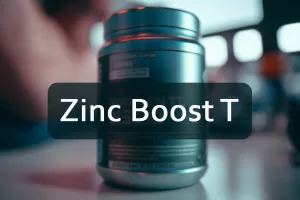Men, especially after their 30s, often look for a way to enhance their testosterone levels. Although this androgen is immensely substantial for male health, its production tends to decline with aging harming both well-being and self-esteem. There are natural methods to achieve this goal and they can be united under the term “wholesome lifestyle”. Yes, a thought-out nutrition plan, the right amount of physical activity, good sleep, and stress management do wonders for one’s health, the hormone balance included. However, a wholesome way of life, while sounds simple, requires a lot of discipline and patience. And people just love immediate results with little effort.
Another, evidence-based, way to increase T level is hormone replacement therapy. A person gets additive testosterone through injections, gels, patches, pills, etc. It only can be done after careful doctor’s evaluation and under constant monitoring. The therapy can be quite costly and often causes adverse reactions.
This became the reason why testosterone boosters are the latest trend. They are supplements based on nutrients, herbal extracts, and other components marketed as “natural” by the manufacturers. T-boosters promise a jumpstart with T levels which assists the customer in gaining muscle, elevating one’s levels of stamina and mood, and improving sexual functions to achieve the desired life quality.
The thing with supplements is that they do not always work. FDA does not control their efficacy, and the result depends on how well the manufacturer picks the components. In the majority of cases, the best you can do is research the most popular products and their ingredients to make an informed decision.
D-aspartic acid, or DAA, can be found quite often in well-reputed T-boosters. So, does it mean that D-aspartic acid can boost testosterone? We searched for related studies published on PubMed and other academic resources to provide you with an accurate, evidence-based answer.
While there is proof that the substance can be beneficial for one’s health, there is not enough data to confidently state that DAA will magic one’s T production back on track.
What is D-Aspartic Acid
To better understand the connection between D-aspartic acid and testosterone, let us start from the basics.
Aspartic acid—a non-essential amino acid, has two forms known as L and D. They are molecules that have the same composition and different structures. You can think of them as two twins that have identical DNA but completely different personalities and skills. L-aspartic acid is used by our bodies to create proteins, and D-aspartic acid takes part in hormone metabolism.
Function in the nervous and endocrine system
DAA is found in the endocrine and central nervous systems where it plays a role of a neurotransmitter/neuromodulator affecting the operation of many glands, such as the hypothalamus and the pituitary gland. Consequently, it has an impact on the production and release of many hormones, such as prolactin, the hormone of growth, gonadotropin-releasing hormone (GnRH), and luteinizing hormone (LH).
D-Aspartic Acid and Testosterone
GnRH and LH are directly involved in testosterone production. GnRH stimulates the pituitary gland to release LH which, in turn, makes Leydig cells in the testes produce and release T. It was only logical to suggest that more DAA will mean a higher concentration of these hormones, and thus—stimulated testosterone output.
In vitro studies have supported this theory in rat models, but studies in human volunteers have produced inconsistent and unclear results. This was summarized in a systematic review published in the International Journal of Reproductive Biomedicine. For example, there is a study that included 23 participants who took DAAs and 20 people who took a placebo. The same was done by groups of rats. After 12 days, the researchers assessed the subjects’ hormone levels and found that both humans and DAA-treated rats had elevated levels of LF and T.
There were also studies comparing the effect of the amino acid on sedentary and physically active males. While those volunteers who did not have enough physical activity, had an increase in T levels, there were no changes in those who were quite sporty.
Obviously, studies with a dozen or two human participants cannot be considered a good representation of how our bodies react to various chemicals. Such numbers are simply statistically insignificant. And while those results allow us to make assumptions, it is clear that more quality research is required. Until it is conducted, we cannot consider D-aspartic acid an efficient supplement for testosterone boosting.
D-Aspartic Acid Benefits
If all the scientific evidence is so vague, why would anyone think that DAA supplementation is a worthy idea? Firstly, we already know that with supplements, there are always non-responders. So, it is up to an individual to decide, whether are they willing to take the risk for potential benefits. We tried to list everything that D-aspartic acid may do for testosterone or some other aspects of physical health.
Testosterone
As you can conclude from the information above, DAA is not a magic miracle for your T. However, the helpful effect on testosterone production still can happen, particularly for those who are already battling its deficiency and do not have sufficient physical activity.
Nervous System
Acting as a neurotransmitter/neuromodulator, DAA promotes the regulation of endocrine functions through neural signals. In other words, the amino acid helps the body to support homeostasis by contributing to the connection between the brain and other systems in the organism.
Hormone Production
Taking part in hormone production and release (we listed some of the hormones in the section about the nature of DAA), D-aspartic acid helps to regulate many vital physiological processes and characteristics, such as patterns of sleep and energy use, digestion, appetite, metabolism, blood pressure, and reproduction.
Male Fertility
Although it is still debatable that D-aspartic acid can increase testosterone, it seems that the substance can improve fertility in AMAB persons. In a trial, where sixty men were taking DAA for three months, the number and motility of sperm in participants increased. Moreover, during a study, almost a third of their partners became pregnant.
Side Effects and Risks
We always remind you that individual side effects are possible with supplements and drugs. Moreover, we always advise you to speak with a medical professional before you begin taking any supplements, especially if you have chronic health issues or take medications. If you started DAA and noticed the negative adverse reaction, stop taking the product and consult your healthcare provider.
However, DAA is considered safe—the study of blood analysis after three months of use revealed no health threats.
Dosage and duration of use
In trials reporting positive results of DAA, the dosage of amino acid varied from 2.6 g to 3 g per day. There is no evidence that excessive amounts (e.g. 6 g) provide noteworthy improvements.
The studies mentioning valuable results with no adverse reactions lasted 3 months.
Natural Ways to Boost Testosterone
As stated in the introduction to this material, there is a 100% working, 100% safe, and 100% natural way to give your T levels a boost that is called “a healthy lifestyle”. A wholesome way of life is providing your body with the nutrients it needs, keeping yourself strong and healthy with physical activity, and allowing it to rest and recover properly. Let us break down every point separately.
Balanced diet
The smart and thought-out nutritional plan will give your organism macronutrients, vitamins, minerals, amino acids, and valuable phytochemicals without any supplementation. Better yet, some foods are naturally packed with compounds known to be beneficial for men’s testosterone! To build up your androgen hormones, incorporate these health-giving and delicious products in your meals:
- Ginger;
- Green vegetables;
- Raw onion and garlic;
- Pomegranate and red berries;
- Lemons and honey;
- Oysters and seafood;
- Olive oil;
- Bananas.
It’s best to avoid canned and junk food – they don’t contain nutrients, can disrupt metabolism, and even cause some health problems.
Regular exercise
Mikhail Varshavsky, known on YouTube as “Dr. Mike”, once said that if humanity invented a drug that replaces the beneficial effects of sports, it would be used by billions of people, and the inventor themselves would get a Nobel Prize. Physical activity truly gives you a lot:
- improves cardiovascular health
- boosts mood
- improves sexual function
- makes you feel younger and stronger
- normalizes hormone balance and sleep
- helps with stress management, etc.
And there is strong scientific proof that regular exercising increases testosterone production as well!
Managing stress and sleep
Stresses and insomnia cause the raise in your levels of cortisol—a hormone that inhibits testosterone production. Remember that your body needs proper rest to digest and absorb nutrients, recover after your daily activities, and prepare for a new challenge. Managing your sleep, and reducing your reaction to stresses with the help of yoga, sports (!), art therapy, positive thinking, and whatever works for you, is important to stay happy and healthy.
Ditching bad habits
Smoking and drinking take a heavy toll on your body, starting from cardiac health to reproductive functions. Quitting cigarettes and alcohol can be quite helpful to restore your body’s natural balance. If you have trouble doing it by yourself, do not hesitate to opt for counseling.
Summary
D-aspartic acid is a popular component in testosterone-boosting supplements. However, the final scientific data to confirm or deny its effect is yet to be found through quality research. While there is no evidence that D-aspartic acid lowers testosterone, there is either no guarantee that it will be beneficial for those who are trying to manage testosterone deficiency.
FAQ
Does D-aspartic acid increase testosterone levels?
The related studies provide very mixed and inconsistent results. Some research says it may be beneficial while in other cases, there were no effects.
How long does it take for D-aspartic acid to increase testosterone?
In successful studies, participants took DAAs for about 90 days.
What does D-aspartic acid do for bodybuilding?
There is no evidence that DAA improves response to physical activity or increases testosterone levels in physically active people.
Is D-aspartic acid safe for men?
3-month trial with blood analysis found no serious health threats. However, individual side effects are still possible.
Will taking D-aspartic acid make balls bigger?
Evidence on the correlation between testicular volume and testosterone level is weak at best. While steroids or hypogonadism can cause testicular shrinking, the reverse effect is not universal. In any case, an increase in testicular volume can be rather a sign of health issues that T production improvement, and we recommend consulting a urologist if you notice any.







